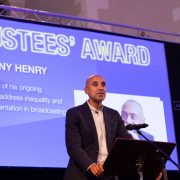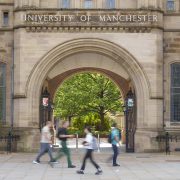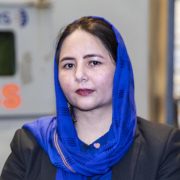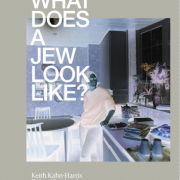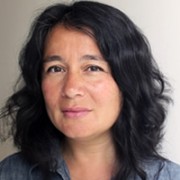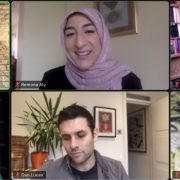Posts
Film and TV Charity survey
/0 Comments/in General, news and current affairs, Outreach, representation, Uncategorized /by Marcus RyderKeeping the Faith
/0 Comments/in BBC, Events, General, journalism, Media Salons, news and current affairs, public service broadcasting, Religious broadcasting, representation, Research /by Edward StourtonA brief history of religious broadcasting in the UK
/0 Comments/in General, public service broadcasting, Religious broadcasting /by Anna McNameeWomen, work, education and religion in Afghanistan
/0 Comments/in Awards, Events, General, journalism, news and current affairs, Outreach, public service broadcasting, Religious broadcasting, representation /by sandford-masterWhat Does a Jew Look Like?
/0 Comments/in Awards, General, public service broadcasting, Religious broadcasting, representation /by Keith Kahn-HarrisPublic service broadcasting and the art of “calm scrutiny”
/0 Comments/in BBC, Government policy, journalism, news and current affairs, public service broadcasting, Religious broadcasting /by sandford-editorThe importance of stories
/0 Comments/in Awards, Events, General, House of St Barnabas, Media Salons, Outreach /by Anna McNameeSupporting Broadcasters During COVID
/0 Comments/in Events, journalism, Media Salons, Outreach, Research /by Anna McNameeMeaning and the Media – the Sandford St Martin Awards 2017
/0 Comments/in Awards, General /by Angela GrahamOn the evening of 7 June the 2017 Sandford St Martin Awards were handed out during a gala ceremony held at Lambeth Palace. Again this year, the Trust had the honour of hosting some of the most talented programme-makers, broadcasters and journalists engaging with the subject of religion, belief and ethics in the UK today. Among them was the TV producer and writer Angela Graham who has written about the Awards in her blog.
Photos below are by Charlie Fordham-Bailey
Angela’s profile photo on the ‘Latest Posts’ page is copyright @HirstPhotos
Meaning and the Media – the Sandford St Martin Awards 2017
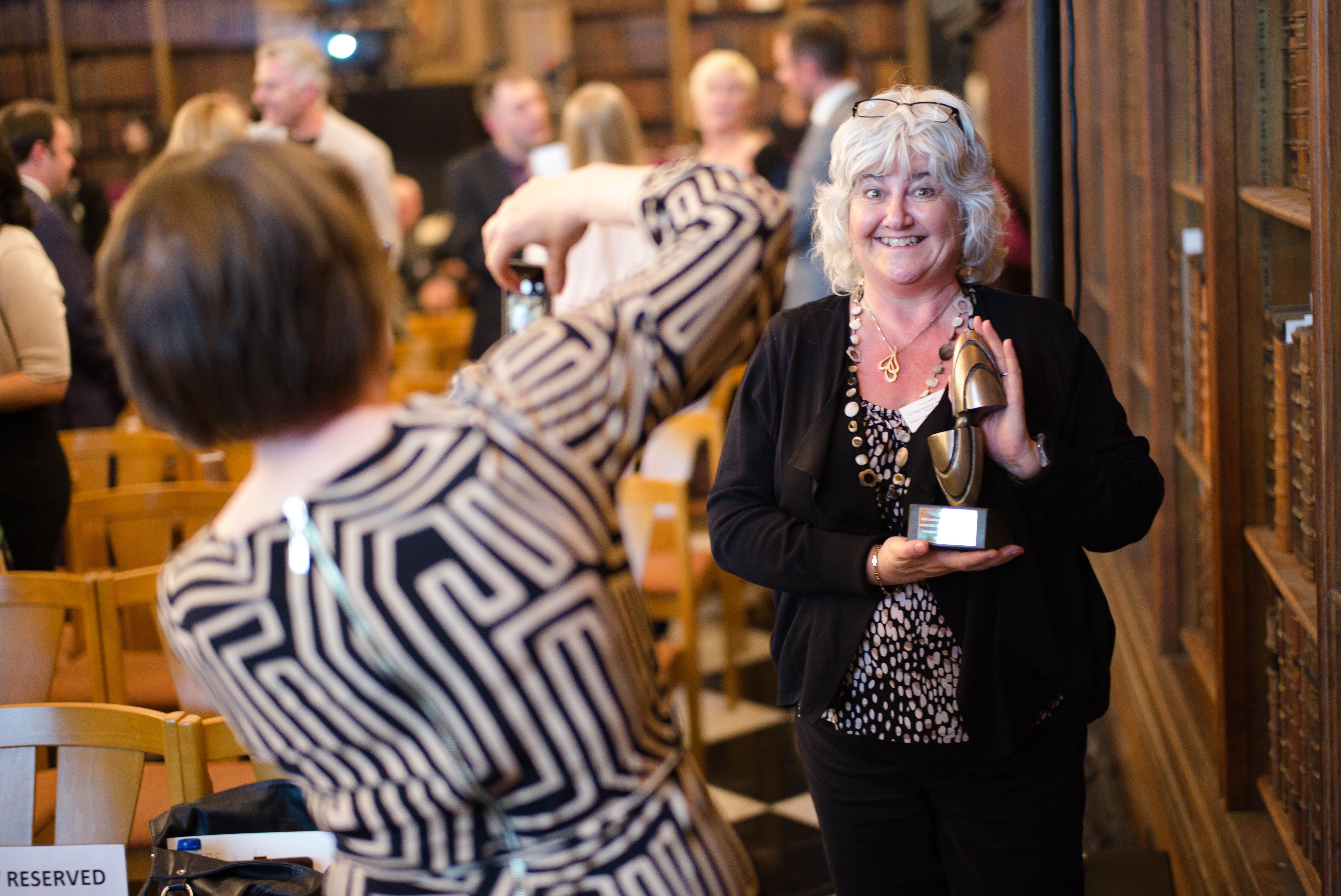
Karen Walker, Producer of ‘All Things Considered: Aberfan 50 Year Anniversary’ made by the Religious Programmes Department at BBC Radio Wales, winner of the 2017 Radio Award, photos by Charlie Forgham-Bailey
by Angela Graham
The Sandford St Martin Awards made me greedy. How could they tempt me with such a rich list of nominations and not expect me to want to indulge in all of them as quickly as possible!
Marian Partington on forgiving Fred and Rose West who killed her sister, or the great Marilynne Robinson on Fear, both in the Interview of the Year shortlist, or ‘Muslims Like Us’ with its reality-tv take on a major faith’s diversity and unifying core or, ‘The Selfless Sikh’ about a faith impelling humanitarian action … Could you blame me for wanting to absorb them all straight away?
Despite the range of topic and approach across the 30 finalists there is a prominent common factor, and it’s what makes the line-up such an attractive one: engagement with why people are making particular choices; helping or damaging others; living as they do. The programmes examine not only who’s doing what, when and where but the deep motivations that push them to grapple with the tangibles and intangibles of life.
Such interrogation is not confined to Religious Programming but this genre steps out into that intriguing area of an individual’s relationship to a Being or a Universal Agent and the ramifications of that for a person’s relations with others: the religio part of religion, the One with the Many. And the Absolute – it takes that on too.
The truths we live by appear to be increasingly various. Even those who live within the parameters of the most established of creeds must attend to a multiplicity of belief positions around them. I will definitely be looking out for the radio documentary, ‘Canada’s Atheist Minister’ (BBC Production North for BBC World Service) which offers insight into the experience of a pastor who found herself delivering a sermon in which she stated that she didn’t believe ‘in a God who answers prayer’ or fulfil many of the requirements usually expected of a deity and certainly not a Christian one. Radio can put me in touch with this fascinating experience.
I’d say it’s easier to get below the surface of atheism in Britain via the media than in face-to-face encounters. There is a substantial amount of ecumenical and inter-faith activity but far fewer opportunities for dialogue in depth between those of religious faith and those without it. This is the Cinderella dialogue in my own Church, the Catholic, despite encouragement from the Vatican.
Several years ago I trialled such an encounter group in Cardiff, calling it Meaning To Live because that name seemed to me an indication of the common ground. I don’t think we hit on the perfect methodology but we found a way to have the sort of open, mutually respectful, willing-to-learn, robust conversation we hadn’t found the opportunity to have anywhere else.
It concerns me that we don’t have many arenas in which we can examine belief in the sense wider than, but including, the religious. This is one reason why the media are so important and why it’s equally important to provide media professionals with the tools to handle issues of belief and faith well.
On the Sandford St Martin site are two blogs I’ve written about an initiative for journalists run by the training arm of the NUJ in Wales. This aims to give journalists access to expertise and resources which can enable them to improve their coverage of news and current affairs that have a religious or belief aspect. In Wales, until I gave a modest class on the subject this January at Cardiff University, no School of Journalism had offered any teaching at any level on religious literacy and, before these workshops, there was nothing on offer for professionals either. I’m glad to say the interest has been significant and we’re in discussion about a third event.
The profile of religious literacy is rising and, as it does so, critique of justification for it and of its worth relative to that of sociology is needed. Prof. Adam Dinham’s work at Goldsmith’s is prominent. His book, Religious Literacy in Policy and Practice Bristol: Policy Press Dinham A & Francis M (eds) (2015) is essential reading.
It’s good to see the current BBC review of its Religious, Ethics and Philosophy programming under Mark Friend. If the Sandford shortlist is anything to go by, it’s the PSB BBC that is doing the heavy lifting in these fields.
As a broadcaster in Wales it was an especial pleasure for me that the Radio Award was won by ‘Aberfan 50 Year Anniversary’, a programme within the long-running, weekly religious affairs series, ‘All Things Considered’. Director, BBC Cymru Wales, Rhodri Talfan Davies tweeted last night, ‘Quality counts − a superb team who deliver each and every week’. They certainly do. Producer, Karen Walker and Presenter, Roy Jenkins are ‘modest beyond’, as the Welsh say. Karen would never tell you that the walls of her office are invisible beneath the array of awards acquired over the years. Now they have a trophy to find a spot for.
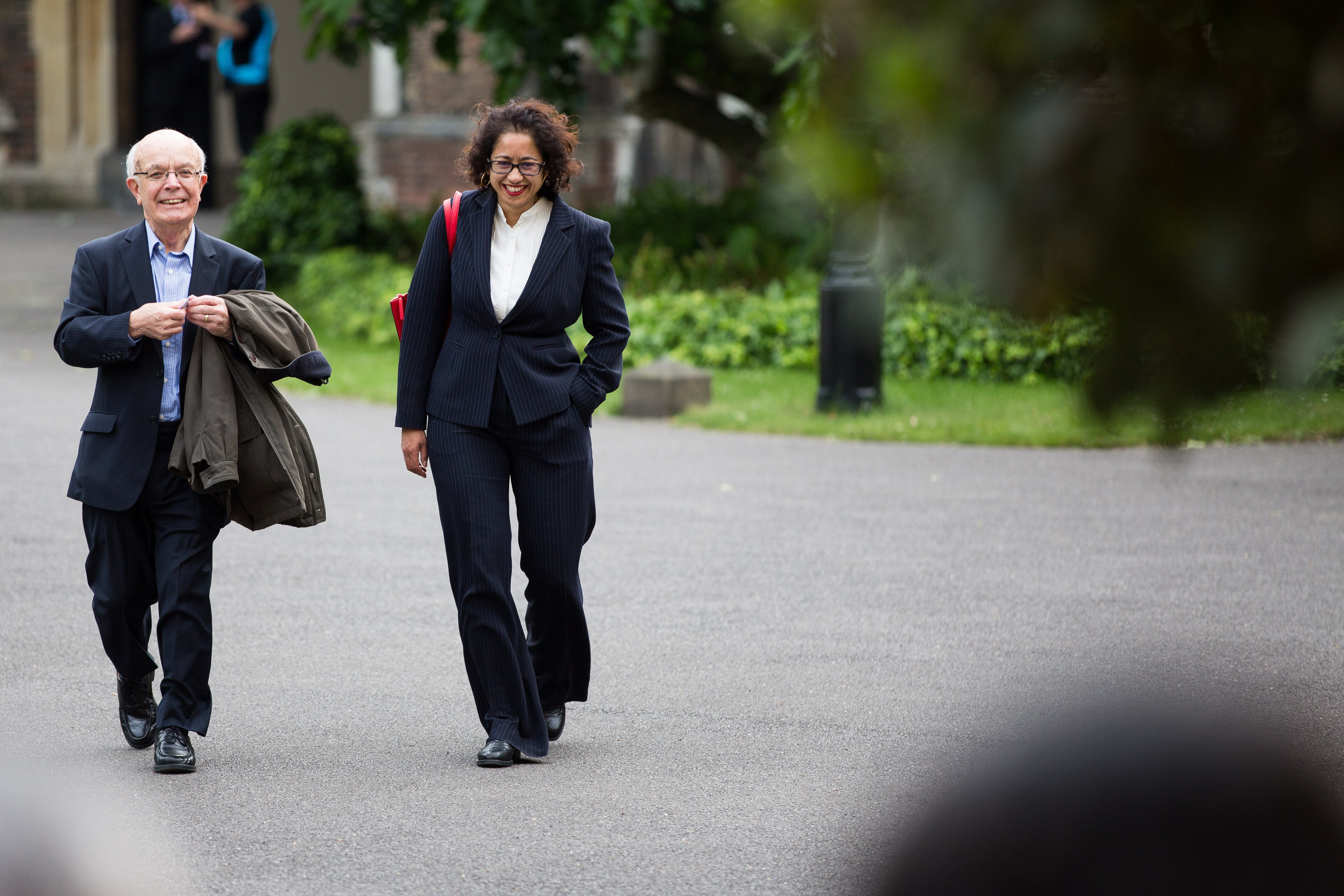
Rev Roy Jenkins with fellow broadcaster Samira Ahmed arriving at the Sandford St. Martins Awards 2017 held at Lambeth Palace.
For a full list of the 2017 Sandford St Martin winners click here.
Find out more about Angela on her website: http://angelagraham.org/
CONTACT US
Sandford St Martin Trust
Church House
Great Smith Street
London
SW1P 3AZ
Email: info@sandfordawards.org.uk
Tel: 07749875477
Recent blog posts
- Timely documentaries exploring assisted dying October 16, 2024
- Expanding the evidence base for UK public service media policymaking October 11, 2024
- Shared language for the soul June 20, 2024
JOIN OUR COMMUNITY
At the Sandford St Martin Trust we’re interested in how religion and belief are portrayed in the broadcast media. We believe that faith – whether you have it or not – plays a complex role in human experience and that a better understanding of what people believe can support stronger secular communities. Think that sounds interesting? Why not sign up for our newsletter and join us at one of our forthcoming events aimed at stimulating and contributing to the debate around what is good religious content.
We look forward to meeting you!



